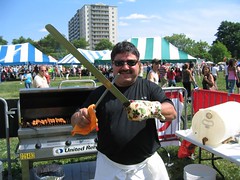
Today and tomorrow, the region is celebrating a
Multicultural Festival at Victoria Park in Kitchener. My wife and sons and I always try to attend, mainly because we love the food, the mingling of people of differing national and ethnic backgrounds, and because it's a celebration of tolerance and respect for one another. It doesn't hurt, of course, that it's almost always held on the first weekend after the start of summer when the weather is usually perfect.
Last year, I had just started chemotherapy and was still very sore from my hospitalization for surgery and post-surgical complications. But we still all had fun and I was able to find shaded areas under the massive trees in the park when I needed to be off my feet.
This year, I am feeling far stronger and I am very much looking forward again to the good food, the drinks, the flags of different countries blowing in the wind, the opportunities for some great photographs to upload to my Flickr account, and a chance to glimpse how the cultural melange of K-W appears in 2007.
I am fortunate, as well, to work with a company where there is a variety of ethnic and cultural backgrounds represented.
Most days, I can honestly say that everyone demonstrates mutual respect for our differences, engendered mainly by trust in one another. Trust in the workplace is about belief in another person's character and their competence to do the job for which they receive compensation. Trust in all relationships is about character and competence too.
Respect, however, is one of those fuzzier concepts that often reflects differences between religions, cultures and ethnic backgrounds. At one time, respect for elders was sacramental in nature for some cultures and religions - Confucianism comes to find as but one example.
Today, in a more secular and multicultural environment, I think it's fair to say that respect doesn't mean the same to us as what it did to white, Anglo-Saxon protestants of the 1950s, 1960s era. There are still some who would say that disagreement with one's parents or elders, for example, is unacceptable because it is disrespectful. There is a hierarchy in a family, the rationale goes, and if you know your place, open disagreement shows a profound lack of respect for your superiors in that hierarchy.
I disagree. Respect, I would argue, is about two things: courtesy to those with whom you interact regularly, whether they are family members or not; and trust among those who relationships are more intimate, again, whether they be family members or not. In other words, the familial relationship doesn't confer any special privileges or responsibilities in regards to the concept of respect.
In a multicultural, multiethnic society, we are sometimes told to respect one another. If this means that we act with courtesy towards one another, then I'm in total agreement. If this is meant to imply that we trust one another, then I have to say, "Not unless you can demonstrate the integrity of character and competence required to engender trust." Similarly in family situations. If respect is about courtesy, I'm all for it. If it's about children never disagreeing with their parents or grandparents or other elders, I think that concept is outmoded and needs to be put in the trash bin of history.







